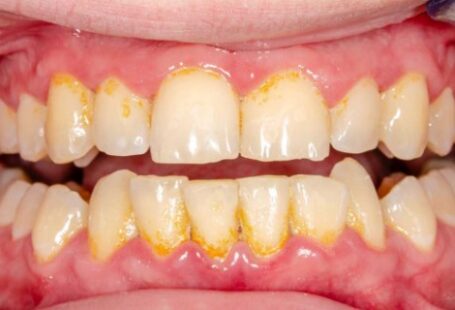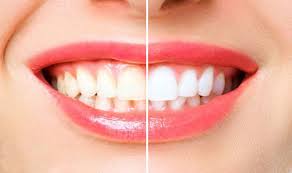What causes gums to bleed?
Gums can bleed for a variety of reasons, some of which include:
- Gum disease: Gum disease, also known as periodontal disease, is a common cause of bleeding gums. It is caused by bacteria in the mouth that build up in the spaces between the teeth and gums, leading to inflammation and bleeding.
- Poor oral hygiene: Inadequate brushing and flossing can allow plaque to build up on the teeth and gums, leading to inflammation and bleeding.
- Medications: Some medications, such as blood thinners, can cause bleeding gums as a side effect.
- Hormonal changes: Hormonal changes during pregnancy, puberty, or menopause can cause gums to become more sensitive and prone to bleeding.
- Vitamin deficiency: A lack of vitamin C or K can cause gums to bleed.
- Infection: An infection in the mouth, such as a bacterial or fungal infection, can cause gums to bleed.
- Trauma: Trauma to the gums, such as from aggressive brushing or a sports injury, can cause bleeding.
It’s important to see a dentist if you experience bleeding gums, as it can be a sign of a more serious oral health issue.
What deficiency causes bleeding gums?
A lack of vitamin C or K can cause gums to bleed. Vitamin C is essential for maintaining healthy gum tissue, and a deficiency can lead to a condition called scurvy, which causes bleeding gums, among other symptoms. Vitamin K is important for blood clotting, and a deficiency can also cause bleeding gums.
It’s important to have a balanced and nutritious diet to ensure that you are getting enough vitamins and minerals to maintain good oral and overall health. If you suspect that you have a vitamin deficiency, it’s recommended that you speak to your healthcare provider or a registered dietitian.
How do you stop bleeding of gums naturally?
Here are some natural ways to help stop bleeding gums:
- Saltwater rinse: Rinse your mouth with warm salt water (1 teaspoon of salt in a cup of warm water) for 30 seconds to a minute. Saltwater can help reduce inflammation and promote healing.
- Vitamin C-rich foods: Eat foods rich in vitamin C, such as citrus fruits, strawberries, kiwi, and broccoli. Vitamin C is essential for healthy gums and can help reduce inflammation.
- Tea tree oil: Dilute a drop of tea tree oil in a cup of warm water and rinse your mouth with it. Tea tree oil has antimicrobial properties that can help reduce the bacteria in your mouth.
- Coconut oil pulling: Swish a tablespoon of coconut oil in your mouth for 10-15 minutes, then spit it out. Coconut oil pulling can help reduce bacteria in the mouth and promote gum health.
- Aloe vera: Apply a small amount of aloe vera gel directly to the affected gums. Aloe vera has anti-inflammatory properties that can help reduce swelling and bleeding.
It’s important to note that these natural remedies are not a substitute for regular dental care. If you experience persistent bleeding gums, it’s important to see a dentist to determine the underlying cause and receive appropriate treatment.
What should I eat when my gums are bleeding?
When your gums are bleeding, it’s important to maintain a balanced and nutritious diet to support your overall health and help your body heal. Here are some foods that can be beneficial for your gums:
- Vitamin C-rich foods: As mentioned earlier, vitamin C is essential for healthy gums, so it’s important to eat foods that are high in this nutrient. Good sources of vitamin C include citrus fruits, strawberries, kiwi, papaya, mango, bell peppers, broccoli, and Brussels sprouts.
- Vitamin K-rich foods: Vitamin K is important for blood clotting, which can help stop bleeding gums. Foods rich in vitamin K include leafy greens, such as spinach, kale, and collard greens, as well as broccoli, Brussels sprouts, and parsley.
- Foods high in antioxidants: Antioxidants can help reduce inflammation and promote healing. Good sources of antioxidants include berries, nuts, seeds, and leafy greens.
- Lean protein: Protein is important for tissue repair and can help support gum health. Good sources of lean protein include fish, chicken, turkey, eggs, and beans.
- Water: Staying hydrated is important for overall health and can help flush out bacteria in the mouth that can contribute to bleeding gums.
On the other hand, it’s best to avoid foods that are high in sugar, as they can contribute to the growth of bacteria in the mouth and worsen gum inflammation. You should also limit your intake of alcohol and tobacco, as they can irritate the gums and contribute to bleeding.
What foods to avoid with bleeding gums?
When you have bleeding gums, it’s important to avoid foods that can further irritate or damage the gums. Here are some foods to avoid:
- Sugary and acidic foods: Foods that are high in sugar or acid can contribute to the growth of bacteria in the mouth and worsen gum inflammation. This includes sugary snacks, soda, fruit juice, and citrus fruits.
- Sticky foods: Sticky foods, such as candy or dried fruits, can get stuck between teeth and gums and contribute to plaque buildup, which can lead to bleeding gums.
- Tough or hard-to-chew foods: Tough or hard-to-chew foods, such as hard candy or popcorn, can irritate the gums and cause further bleeding.
- Spicy or hot foods: Spicy or hot foods can irritate the gums and cause discomfort.
- Alcohol and tobacco: Both alcohol and tobacco can irritate the gums and contribute to bleeding.
It’s also important to maintain good oral hygiene practices, such as brushing and flossing regularly, to help prevent bleeding gums. If bleeding gums persist, it’s important to see a dentist to determine the underlying cause and receive appropriate treatment.
How long will bleeding gums last?
The duration of bleeding gums can vary depending on the underlying cause and how quickly it is treated. In some cases, bleeding gums may stop after a few days of practicing good oral hygiene, such as brushing and flossing regularly, and avoiding irritants like tobacco and alcohol. However, if the bleeding persists or is accompanied by other symptoms, such as swelling or pain, it’s important to see a dentist or healthcare provider.
Some of the most common causes of bleeding gums, such as gum disease or vitamin deficiencies, may require longer-term treatment to address the underlying issue. For example, gum disease may require professional cleaning or other dental procedures, as well as ongoing at-home oral hygiene practices. In cases of vitamin deficiencies, supplements or changes in diet may be needed to restore the proper nutrient levels in the body.
In general, it’s important to address bleeding gums as soon as possible to prevent further damage to the gums and teeth, and to reduce the risk of complications.
Do bleeding gums mean infection?
Bleeding gums can be a sign of infection, but they can also be a symptom of other underlying issues. The most common cause of bleeding gums is gingivitis, which is a mild form of gum disease that is caused by a buildup of plaque on the teeth. When plaque is not removed through regular brushing and flossing, it can irritate the gums and cause them to bleed.
In addition to gingivitis, bleeding gums can also be a sign of more advanced forms of gum disease, such as periodontitis. This is a more serious infection that can cause damage to the gums and bone that support the teeth. Other potential causes of bleeding gums include vitamin deficiencies, hormonal changes, certain medications, or injury to the gums.
It’s important to see a dentist or healthcare provider if you experience bleeding gums, especially if it persists or is accompanied by other symptoms, such as swelling, redness, or pain. A dental professional can help determine the underlying cause of the bleeding and recommend appropriate treatment. In some cases, antibiotics or other medications may be necessary to treat an infection or other underlying issue.
Does bleeding gums mean tooth loss?
Bleeding gums do not necessarily mean tooth loss, but they can be a warning sign of potential gum disease, which is a leading cause of tooth loss in adults. When left untreated, gum disease can progress and cause damage to the bone and tissues that support the teeth, leading to tooth loss.
Gum disease typically begins with gingivitis, which is a mild form of gum inflammation caused by a buildup of plaque on the teeth. If left untreated, it can progress to periodontitis, which is a more serious infection that can cause damage to the gums, bone, and other tissues that support the teeth.
It’s important to see a dentist or healthcare provider if you experience bleeding gums, especially if it is persistent or accompanied by other symptoms, such as swelling, redness, or pain. Early detection and treatment of gum disease can help prevent tooth loss and other potential complications. Regular dental check-ups and cleanings, along with good oral hygiene practices, can help prevent gum disease and other oral health issues.
When should I be worried about bleeding gums?
You should be worried about bleeding gums if it is persistent or accompanied by other symptoms, such as swelling, redness, or pain. Here are some situations when you should be concerned about bleeding gums:
- You experience bleeding gums regularly: If your gums bleed regularly, it may be a sign of an underlying issue, such as gingivitis or periodontitis.
- The bleeding is severe: If the bleeding is heavy or you’re losing a lot of blood, seek immediate medical attention.
- You have other symptoms: If you experience other symptoms, such as pain, swelling, or redness, it may be a sign of an infection or other underlying condition.
- You have a family history of gum disease: If your family has a history of gum disease, you may be at higher risk for developing the condition.
- You have difficulty eating or speaking: If bleeding gums are making it difficult for you to eat or speak, it may be time to see a dentist or healthcare provider.
If you are concerned about your bleeding gums, it’s important to see a dentist or healthcare provider. They can help determine the underlying cause of the bleeding and recommend appropriate treatment. Early detection and treatment of gum disease can help prevent tooth loss and other potential complications.
What is the best toothpaste for bleeding gums?
When it comes to selecting the best toothpaste for bleeding gums, it’s important to look for toothpaste that contains ingredients that promote healthy gums and help reduce inflammation. Here are some ingredients that are commonly found in toothpaste that can help with bleeding gums:
- Fluoride: Fluoride can help strengthen tooth enamel and reduce the risk of tooth decay. It can also help reduce inflammation and improve gum health.
- Stannous fluoride: Stannous fluoride is a type of fluoride that has been shown to be particularly effective in reducing gingivitis and improving gum health.
- Triclosan: Triclosan is an antibacterial agent that can help reduce the bacteria that can cause gum disease.
- Zinc citrate: Zinc citrate can help reduce plaque buildup and improve gum health.
- Potassium nitrate: Potassium nitrate can help reduce tooth sensitivity, which can be a common problem for people with bleeding gums.
Some popular toothpaste brands that are designed to promote healthy gums include Crest Gum Detoxify, Colgate Total Gum Health, and Sensodyne Pronamel Gentle Whitening. However, it’s important to consult with your dentist or healthcare provider to determine the best toothpaste for your individual needs. They can help recommend a toothpaste that is specifically tailored to your oral health concerns.







